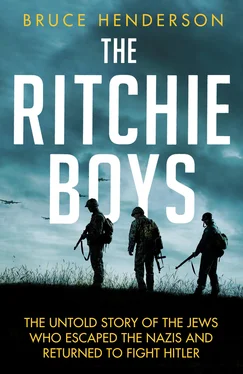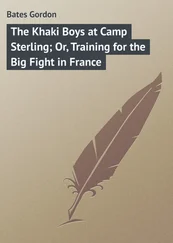Two Gestapo agents had come to pick him up the other night, Arthur said, when he was out taking tobacco orders from his customers. Jewish men were being arrested in their own homes for no reason, he explained; the Nazis would show up late at night, when they thought people would be in bed. When they came for Arthur, Johanna told the men she didn’t know when he would be back. They waited for an hour before leaving. When would they return? Afraid even to be home, Arthur had begun leaving in the early evening and walking the streets most of the night. He and Johanna had worked out a signal. If men were waiting, she would place the parakeet’s cage in the window, and Arthur would keep walking. If he didn’t see the cage, it was safe to come up.
They had decided it was time to get out of Germany, he told his son. Johanna had a distant cousin living in Boston. Though they had never met, she had written him to see if he would be able to sponsor the three of them for entry into America. Stephan’s father explained that they would be submitting visa applications to the U.S. State Department. It was still possible for Jews to leave Germany as long as they didn’t take any money or other assets. But the emigration doors could slam shut at any time; America’s policy could change as well. Adding to these uncertainties, the German government had recently started civilian rationing of meat, coffee, and butter. Arthur took that as a sign that all-out war was imminent. If they didn’t leave soon, he feared that they might never be able to get out.
Part of the visa process involved an appointment at the U.S. consulate for medical exams to ensure the applicants were not carriers of infectious diseases and were otherwise in good health. Johanna and Stephan passed, but Arthur was notified that he had failed because of his high blood pressure. He would go on medication, change his diet, and try again to pass the exam, but it would take time.
Arthur and Johanna broke the news to Stephan during his next Sunday visit. Though he was disappointed to hear that they would not be leaving Germany any time soon, the thought that they would not all be together made Stephan feel even worse. He had thought a lot about what it would be like to be part of a family again, to live at home with parents instead of at the orphanage. Emigration to the United States had offered more than safety—it was a chance to again live under the same roof with his parents at long last.
“You know how concerned we are for your safety?” asked Johanna.
Yes, Stephan did know.
It had become increasingly dangerous for Jews to remain in Germany, Arthur said. He and Johanna had decided to send Stephan out of the country ahead of them. “We are taking advantage of a plan offered through the orphanage,” he said.
“What kind of plan?” Stephan asked.
His father explained that European countries like England, Denmark, Holland, and France were admitting unaccompanied Jewish children as refugees. He had learned from Auerbach administrators of arrangements they were making to send some children to Paris, where they would be cared for by a Jewish rescue organization. He had already signed Stephan up. It would be safer for him in France, said his father.
“Leave Germany without you?”
Stephan realized his dream of reuniting with his parents was lost.
His father promised that they would join him as soon as possible in France—or possibly in America. “We’ll see. We will write each other.”
On July 4, 1939, Arthur and Johanna took Stephan to Berlin’s cavernous Anhalter Bahnhof railroad station. There, they found a group of about forty boys and their chaperons off in one corner. Stephan knew about a dozen of the children from the orphanage. As relatives said their good-byes, many of the younger boys were laughing, joking with each other about the great adventure they would soon embark on. Aware of the trip’s implications, Stephan stayed silent.
None of the adults present, including Arthur and Johanna, revealed to their children any foreboding that they might not ever see each other again. Of course, as the situation in Germany worsened daily, the grown-ups knew this was a possibility. Arthur had had to sign a conservatorship document assigning the legal responsibility for Stephan’s welfare to the rescue organization until he was eighteen. Even without parental permission, the organization would be free to take Stephan to wherever they felt he would be safe.
As the group moved toward the train platform, Stephan heard his father calling out to him: “Be sure to behave.”
Stephan went back to the last car as the train pulled out of the station, and looked out a frost-covered window at Berlin, fading into the distance behind him. With his finger, he drew three X’s in the condensation on the pane. The triple X was a well-known German sign of displeasure. It would be left, for instance, by a customer on the check at a restaurant after a bad meal, signifying that he would not come back.
Stephan was a German, but he was also a Jew. And after what he had already lived through in his young life, he never wanted to return to Germany.
By January 1939, hundreds of the Jews interned at Dachau concentration camp after the Kristallnacht roundups two months earlier had already died, casualties of SS brutality or the vile conditions. After being forced by camp officials to sign over title to his mother’s home, Martin Selling didn’t think he would leave alive. He had every reason to believe the rumors he heard that the crematories in Munich were working day and night to process the corpses from Dachau, a result of the major influx of Jews into the camp beginning in November 1938. 1
But some Jewish prisoners were luckier—about half of those brought in after the roundups had been released to ease overcrowding, with priority given to those who could prove they had a way to get out of Germany. The population decrease in the camp meant there were now enough thin blankets to go around; each inmate could have his own during the frigid nights. Martin found some sewing kits and put his tailoring skills to work, repairing the straw mattresses and prison uniforms. He also gathered some of the cleaning cloths used to prepare the barracks for inspections and sewed them together into a long-sleeved undershirt. Wearing his new shirt under the lightweight prisoner garb helped cut the chill. When the other prisoners saw what he had done, they asked him to make undershirts for them, too. The guards began to notice the shortage. Word spread that at the next inspection, the guards would be looking for the missing cloths, and anyone found with them would be punished. Martin collected all the undershirts he had made, took out the seams, and folded them so as to hide the alterations. When the guards searched, they found only neat piles of cleaning rags, which had somehow reappeared.
The highlight of each day came after the evening meal, when the guards posted a list of the prisoners who would be processed for release the next day. Every day Martin hoped his name would be on the list, and every day he was disappointed. By the time his name appeared—January 27, 1939—he was the last of the nine men who had come in with him on the transport from Nuremberg still at Dachau. His friend Ernst Dingfelder, who had tried so hard to stay kosher in Dachau, had been let out a few days earlier.
Martin didn’t sleep at all that night. Each day had been spent just trying to survive. What lay ahead now? he wondered. As he lay awake, he thought about other inmates, men whose names might never appear on the list.
Another friend he had made at Dachau, Alois Stangl, had been a deckhand on a Danube river barge. He was thirty-five years old, but after five years at Dachau, he looked fifty. Although Stangl was a German Aryan, he had been an outspoken member of the Socialist Party, which meant the Nazis considered him an enemy of the regime. His sister was married to a fervent Nazi official, who had denounced Stangl to the party, leading to his arrest. His release would be an embarrassment to the man who had put him there, he told Martin. Alois Stangl saw no chance of ever getting out of Dachau alive.
Читать дальше












